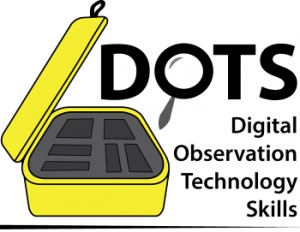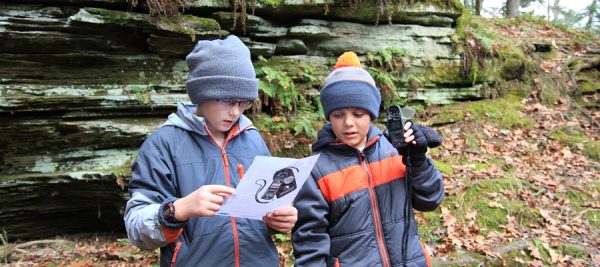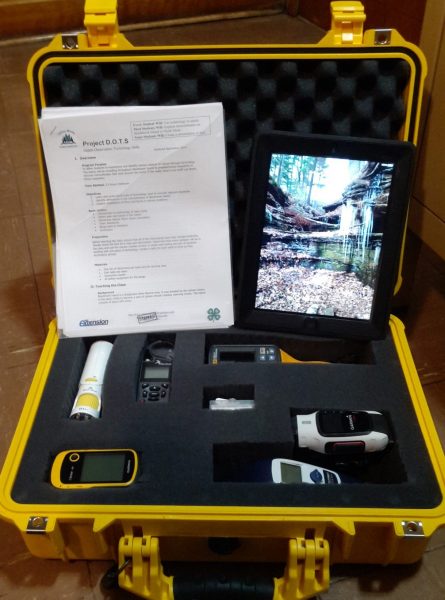
Explore the natural world using innovative and exciting technologies
with a mobile Digital Observation Technology Skills (DOTS) kit!
DOTS Program Overview and Goals
The Digital Observation Technology Skills (DOTS) program is an outdoor Science Technology Engineering and Mathematics (STEM) lesson that uses modern mobile technology tools to connect today’s students to the outdoors in new and innovative ways. This inquiry-based lesson navigates the basics of the scientific method and focuses on the importance of good scientific communication and sharing discoveries with others.

Budding meterologists collect weather data using DOTS tools
Students work in groups to test simple hypotheses about the environmental and ecological differences across the local landscape. By making observations, taking measurements, and exploring the micro and macro details of their environment, participants collect quantitative and qualitative data with the technology tools found in the DOTS kits. In addition, ‘Media Specialists’ are responsible for collecting photo and video evidence of each group’s scientific story to facilitate sharing the results with others.
The DOTS Kits
The DOTS kits provide unique, hands-on opportunities for students to explore details of their environment using modern technology tools that help to turn the invisible, visible.

Contents of the DOTS kits including iPad, technology tools, and lesson worksheets
Paired with the creativity and diversity of student interests, the DOTS kits could make the perfect tools for almost any STEM lesson plan both indoors and outdoors.
Tools and Student Scientific Roles
- Navigator (GPS unit) Provides “Global” view of project and direction
- Media Specialist (video/ digital camera) Captures the story to share with others
- Meteorologist (pocket weather meter) Studies weather patterns
- Microbiologist (digital microscope and iPad) Studies the details of the “small” world
- Thermal Imager/Investigator (infrared thermometer and imager) Searches for temperature differences in the study area
- Trail Cameras Captures animal activity 24 hours a day with motion-sensitive trail cams stationed at each waypoint
Study Topics
The DOTS kit easily serves many study topics, including:
- Scientist roles
- Citizen science
- Data analysis
- Teamwork
- Microclimate adaptations
- Topography
- Seasonality
- Species dominance/competition
Design Considerations
The tools found inside the DOTS kits were each selected with specific criteria in mind. Some of these important tool design considerations include:
- Memory – the ability to store and easily transfer the data it collects to other platforms.
- Power – powered by removable and chargeable battery sources
- Portability – small, lightweight and cordless
- Off-line – does not require internet connectivity to achieve full functionality
- Dedicated device – each tool has a single data role and function
- Platform neutral – tools not tied to a single computer operating system
- Digital artifact – the ability to collect and save data imagery to limit the need to remove material from the field



